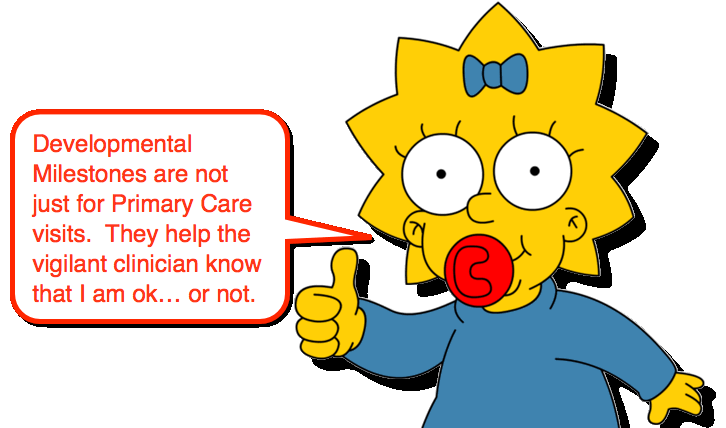Developmental Milestones in the ED
Full Disclosure: I am the proud product of Combined Emergency Medicine and Pediatric training (thank you mentors Mattu, Rogers, Winters, Carraccio et al at U of Maryland). As such, I worked nearly equal amounts of time in the Emergency Department (caring for kids and adults) as I did in my Pediatric clinic over 5 years of residency. That being said, there is a reason I do Emergency Medicine… I could not stand going through the assessment of kids’ Developmental Milestones in the clinic! Certainly it is important… but not for me in the ED… right? Actually, there are many aspects of Developmental Milestones that can be useful to the vigilant clinician in the Pediatric ED.
Not Trying to Make You a PCP
- Many of us in the ED have violent expulsion of gastric contents at the mere mention of considering any topic that is related to primary care.
- While that is understandable (much like, we would not expect or want a Primary Care Physician to be expert in the EM realm), it is still useful to know some topics that bridge both worlds.
- Some EM clinicians are serving as the only access to care a patient has… and need to know some primary care issues.
-
- Almost 30% of 6- to 36-month-old children presenting to an urban PED without prior developmental concerns screened positive for possible delay. (Grossman, 2010)
-
- Prescription of Controller Medications for Asthma is a good example of this (see Twitter conversation for additional thoughts).
- Some EM clinicians are serving as the only access to care a patient has… and need to know some primary care issues.
- Childhood Development is another topic that is not typically placed within the EM realm.
- A full development assessment is actually beyond what can be done in a typical pediatrician’s office schedule.
- Knowledge of basic developmental milestones, however, can help detect important aberrations that warrant further assessment.
- This is particularly true with respect to the very young, as this can have implications in their neurologic exam.
- This is similar to how knowledge of typical growth estimates can help you manage a child in the ED.
Developmental Milestones Basics
- Classically, childhood developmental milestones are divided into different domains:
- Motor
- Motor delays may be the first and most obvious sign of a global developmental disorder (Nortiz, 2013).
- Social
- Language
- Cognitive
- Motor
- Not every kid develops at the same rate, but they generally should progress through the expected milestones in order.
- Two really good resources for Developmental Milestones are:
- CDC – http://www.cdc.gov/ncbddd/actearly/milestones/index.html
- Bright Futures (PDF) – http://brightfutures.aap.org/pdfs/bf3%20pocket%20guide_final.pdf
Typical Infant Developmental Milestones
- Again, kids achieve milestones are various paces… so these are just estimates… but can help define marked abnormalities.
- Motor
- Head Posture / Control
- 8 weeks – can hold head up while prone
- 12 weeks – has some head lag when being pulled from supine position
- 20 weeks – no head lag
- 6 months – complete head control
- Fine Motor
- 2 months – grasps offered item
- 4 months – reaches for objects. Brings hands to mouth (now we are in trouble)
- 6 months – transfers objects form one hand to another
- Gross Motor
- 2 months – begins to push up while prone
- 4 months – able to roll from tummy to back (essentially pushes self over). Bears weight on legs when feet are on a surface. Sits with curved spine.
- 6 months – able to roll from back to tummy. Can sit without support.
- 9 months – sits with straight spine.
- 18 months – should sit, stand, and walk independently.
- Head Posture / Control
- Social / Language
- 2 months – attempts to look at parents. Smiles. Coos.
- 4 months – smiles at people spontaneously.
- 6 months – indicates desire to be picked up. Knows familiar faces and recognizes when someone is a stranger. Babbles.
- 9 months – the height of separation anxiety! Plays “peek-a-boo” and waves “bye-bye.” Understands “No.”
- 12 months – knows one – two words.
- 18 months – knows three – six words (body parts often).
- 24 months – uses two word phrases.
- 36 months – uses three word sentences.
- Cognitive
- Language and Social milestones are closely tied with Cognitive milestones, particularly early on.
- 2 months – regards faces, has differential coos and cries and can indicate wants.
- 4 months – reaches for objects, uses hands and eyes together.
- 6 months – shows curiosity. Uses visual and oral exploration of environment.
- 9 months – has object permanence (looks for item when it is hidden). Learns interactive games.
- 12 months – can follow simple instructions. Bangs objects together.
References
Noritz GH, Murphy NA; Neuromotor Screening Expert Panel. Motor delays: early identification and evaluation. Pediatrics. 2013 Jun;131(6):e2016-27. PMID: 23713113. [PubMed] [Read by QxMD]
Grossman DS1, Mendelsohn AL, Tunik MG, Dreyer BP, Berkule SB, Foltin GL. Screening for developmental delay in high-risk users of an urban pediatric emergency department. Pediatr Emerg Care. 2010 Nov;26(11):793-7. PMID: 20944512. [PubMed] [Read by QxMD]




[…] children have is growing. We have discussed some Growth and Development topics previously (ex, Milestones, Infant Formula, Growth Estimates). Occasionally, that single job of growth becomes too difficult […]
[…] the ED, but mastery of less critical topics (ex, Rash Evaluation, Recurrent Abdominal Pain, Growth, Development, and Fish Hook Injuries) helps optimize efficiency in the ED. One issue that can derail a […]